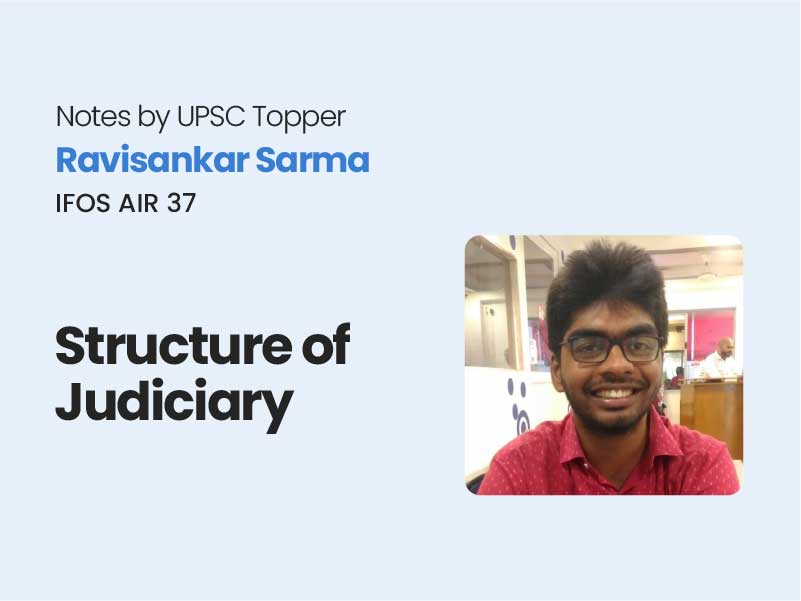Companion@360 → 7 Month programme to sharpen your writing skills → REGISTER NOW

Evolution of Judicial Appointments
The Constitution of India empowered the President to appoint judges of SC and HC on recommendation of the council of ministers in compulsory consultation with the Chief Justice of India and in the case of High Court the Chief Justice of the High Court
In the Sankalchand Sheth’s case (1977), supreme court refrained from equating consultation to concurrence. CJI’s opinion was non-binding on the executive but it must use the non-binding power sparingly in cases of which it would be susceptible to judicial review
In the First Judges case (1981), this viewpoint was further endorsed by the Court
In the Second Judges Case (1998), the Court equated consultation to concurrence. Hence CJI’s opinion, which was now to be shaped by a council of senior-most judges in the SC described as collegium, would now be binding on the executive.
In the Three Judges Case (1998), the court clarified the procedure.
For appointments to the SC- CJI + 4 senior-most judges
For appointments to the HC – CJI + 2 senior-most judges + Consultee Judges ( EX- High Court Judges who are currently SC judges).
Issues with the Collegium System
- Lack of Transparency: The collegium system is a largely opaque system that diminishes the confidence of the public in the appointment of judges and with judiciary in general.
- Affects balance of powers: A system of self-appointment tilts the balance of power in favour of judiciary where other organs exercising no voice in appointments
- Merit Overlooked: Meritorious judges are overlooked due to issues of nepotism and favouritism in appointments. Most times, seniority is the sole criterion
- The concentration of Power with the CJI: The Chief justice of India wields great power despite the 3rd judge’s case stressing that his role is akin to that of ‘first among equals’. Hence there is a dearth of democracy within the collegium system
- Huge Delay: The current system of appointments has led to a huge delay due to enormous procedural problems given the shuttling of applications between the Judiciary and the Executive
Way Forward
- Independent Secretariat: The SC should be given an independent secretariat to assist it in making appointments of judges.
- Improved Transparency: The collegium can bring out in the public its rationale for appointment or non-appointment of judges to enhance public faith in judiciary and its functioning
- Decentralization: The collegium itself should be democratized with CJI holding equal powers to other members. Any arbitrary power vested in him shall be repealed or overturned by a parliamentary legislation
- Time-bound return of MoP
Other Issues
Procedural Delay: According to the Memorandum of Procedure for appointment of judges, the collegium’s recommendations are to be accepted by the government in order for the appointment to be complete. However, a delay in accepting these recommendations as well as disagreements between the executive and the ministry have caused avoidable delays in appointments to the SC.
All India Judicial Services (AIJS)
The utility of AIJS appears prominent in the realms of current judiciary with India offering a mere 17 judges per a million as per the World Justice Report.
Positives of AIJS
- Transparency in Appointments: Centralised recruitment infuses transparency into the judicial system
- Addressing the Human Resource Deficit: Helps to overcome the lack of judges in courts which can reduce the pendency of cases and ensure expeditious dispatch of the same
- Leveraging the talent pool on offer: A wider talent pool is available for recruitment
- Greater Efficiency: Fresh blood can infuse efficiency into the judicial system and an All India services ensures uniformity in quality and functioning across states
- Boon to an integrated judiciary that is envisaged in the constitution
- Enable expertise garnering for judges
Challenges of AIJS
- Lack of Expertise: Focus needs to be on improving legal education standards in the country as currently there exists a small talent pool from a few recognized colleges
- Lack of Incentive: Low pay and limited avenues of career advancement are roadblocks which AIJS does not address
- Opposition from States: Another all India services affects federal autonomy of states in decision making and is hence bound to face opposition from various states due to its effect on federal framework of the nation
- Opposition from Judiciary: Currently the HC holds the power of appointment of district judges but AIJS will usurp HC’s power of consultation with governor. Current district court judges may also oppose the idea of AIJS due to increased competition for promotions, salary, perks etc.
- Pendency in Higher Judiciary: Lakhs of cases are pending in India’s higher judiciary that cannot be resolved through AIJS at the lower courts
- Government Litigations: The Economic Survey notes the largest number of tax litigations by government departments. AIJS cannot help in addressing the pendency of these cases too.
Allocation of Judges
4 of the senior most judges of the SC came out in public questioning the administration of SC with regard to allocation of cases by the Chief Justice of India. The CJI is the primary functionary with regard to administration of the court. Thus he deals with matters of personnel, postings, allocation of work and other such matters to ensure the administration is smooth and efficient.
In the Campaign for Judicial Accountability and Reforms vs Union of India and others Case, the court identified that the Chief Justice is the ‘Master of the Roster’ i.e. he is the sole authority in matters of allocating cases. Normally, Chief justices however act according to established norms and conventions in exercising this power. However, there exists a possibility of arbitrary usage of power as the CJI is vested with sole discretion that he may abuse the power handed out to him on virtue of being ‘Master of the Roster’.
The CJI is not accountable for his actions as he exercises this discretion provided to him unlimitedly. His decision is beyond the purview of RTI and he is not liable to reason his choice of judges for hearing a particular case.
Consequences
- Holding back meritorious and senior judges: Allocating the same benches to hear sensitive and nationally important issues to a handful of judges cripples the Supreme court by leaving to waste its high quality and experienced judges
- Political Interference: Vesting allocation powers with one authority renders it vulnerable to political interference. As the foremost institution of accountability, this may lead to executive tyranny
- Personal Bias of Allocated Judges: The judiciary does not explicitly take actions based on rational analysis of procedure of law alone. All judges have a personal line of thought that influences their verdicts
- Decreased credibility: As an institution to uphold democracy in the country, biased assignment of cases drastically undermines credibility of judiciary as the guardian of the constitution and fundamental rights of citizens
Way Forward
The CJI’s power to assign cases unilaterally must be checked to be in accordance with established norms and conventions. The SC itself can change the procedure for the same or the parliament may bring in a law saying the same. Such a move would boost transparency in assigning matters to judges and enhance the faith and credibility of the institution of Supreme Court and judiciary in general.

